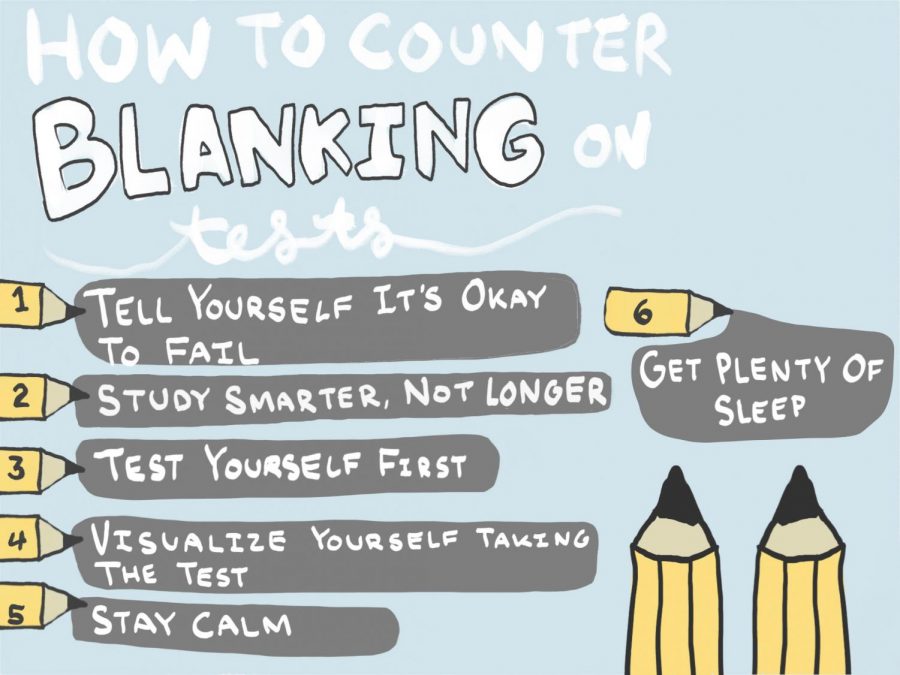Blanking on Tests is a Scientific Phenomenon.
Here’s Six Ways To Counter It.
Tips and tricks for countering test blanking.
You’ve studied countless nights, poured over the material. You’re ready. You look at the first question, and nothing. No answer comes to your mind. You skip to the next question, hoping that the answer will come to you later, only to find that you’re drawing another blank. You start to panic.
A while back, somebody told me that blanking on tests isn’t a real thing, and that if you blank, it’s because you didn’t know the information well enough. As someone who consistently studies with diligence, quizzes myself on the information until I have gotten it right multiple times, then goes in to take the test and draws complete blanks on numerous questions, I was internally very taken aback by this statement. Apparently, with good reason too: saying you blanked on a test with information you know isn’t just an excuse for not studying well enough. It’s an actual, scientific phenomenon.
The main reason to blame for this blanking is test anxiety. It’s actually your high expectations of yourself and the anxiety of living up to them that causes you to underperform on tests. The vicious cycle, according to MentalHelp.net, is that the more anxious you are, the more likely you are to forget. The more you forget, the more anxious you become.
- Tell Yourself It’s Okay To Fail
You aren’t defined by your grade, your worth does not depend on A, and your value is independent from a good test score. It’s been proven time and time again that intelligence does not necessarily correlate with grades– a bad grade doesn’t say anything bad about you as a person. Failure is how we learn best. Failure is something everyone faces. Make sure you tell yourself that.
- Study Smarter, Not Longer
It isn’t actually recommended to study for long periods of time- the brain needs a break. Instead, it’s recommended by MIT that you study for fifty minutes, then take a ten minute break.
- Quiz Yourself
Not only does quizzing yourself help prepare for the test in terms of quelling anxiety, but it’s an incredibly effective way to study. The questions will be more familiar this way, and you know for sure that you’re familiar with the material. Perhaps try filling out the study guide without any of your notes handy, whether after you did it once with your notes or not at all. You can also prepare yourself for the test by taking your practice test in a similar environment to that of the one you’ll be tested in.
- Visualize Yourself Taking the Test
This unique method of memorization helps with both the memory aspect and the mental preparation, helping you stay calm when taking the test and providing a visual reference in your mind. In order to better prepare your mind, imagine yourself writing down all of the answers to the questions you make up and what those answers would be. Be detailed.
- Stay Calm
If you find yourself blanking on a test, don’t panic- I know it’s easier said than done. But the more you panic, the more you will blank. You can try to stay calm by not asking yourself what if questions. Don’t ask “what if I blank on the whole test?”, don’t ask “what if I fail?” Simply move on to the next question if you can’t remember and circle back to it later. If you still can’t remember, tell yourself you’ll do better next time. Plan out how you’ll study for the upcoming test.
- Get plenty of sleep the night before
I know, I know- it’s probably not like you haven’t tried to. But if you can, you should take some melatonin an hour before you intend to fall asleep. When you’re tired, listen to your body and take advantage of that. Getting enough sleep impacts your memory in a large way, so resting enough will likely prevent test blanking.
Studies have shown all six of these things will help students improve their recall memory and thus improve their test scores and reduce blanking. So next time you have a test, try out any or all of these six tips.




